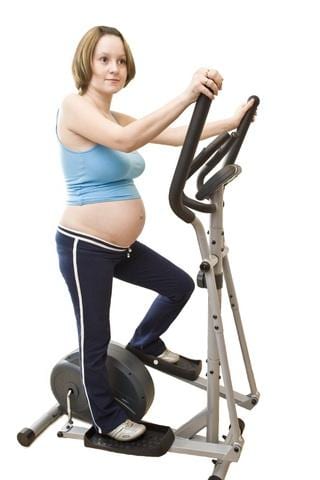You don’t have to give up your workout when you’re pregnant. In fact, maintaining your fitness helps prevent some of the aches and pains that accompany pregnancy. “Working out during pregnancy should not be considered dangerous as long as the activities chosen suit the sensitivity of the pregnancy,” says Fred Devito, vice president, movement classes and training for Exhale Enterprises Inc. Your strong body can also make delivery easier and recovery faster. However, there are some workouts that are not so good when you’re pregnant. Find out what workouts are safe during pregnancy.
Continue Routines
If you already exercised before you got pregnant and are having a normal pregnancy, you can continue with your routine. Experts do suggest you avoid jarring movements such as those experienced while running or doing step aerobics. Women designated by their OB/GYN as high-risk pregnancies should stick to low-intensity and low-duration exercises, Devito advises. If you weren’t very active before you got pregnant, now is not the time to start. “New exercise programs should not be started once a woman becomes pregnant,” Devito says.
Cardio Workout Ideas
Walking and swimming are ideal, low-impact workouts for pregnancy. They get your heart rate up without jostling your joints—and baby. If you walk, wear specific walking shoes, as they’ll support you better than running shoes; or you might try hiking shoes to boost the safety factor if you’re concerned about losing your balance with baby on board. Good posture also helps balance—eyes forward, chin up and shoulders back. Swimmers will enjoy feeling lighter in the water and they’ll reap the benefits including stronger abdominals and lower back.
Strength Workout Ideas
Try pregnancy-specific yoga or pilates, which strengthen, stretch and relax key areas—like the abdomen, back and pelvic region—that help stabilize your body during pregnancy and provide added power for a less taxing labor and delivery. Another option is weight-lifting, but only for women who do this regularly and only with moderate weights. If you normally power-lift, scale back to no more than 50 pounds, for example. Also, watch that your form is correct; your body changes during pregnancy may require you tweak your form. If you have any questions, don’t be afraid to ask a personal trainer to help.
Considerations
All exercise programs should be done with less intensity and shorter duration in warm weather, Devito says. So if you usually lead the group around the track, pull back a little. Also, be careful even in low-impact workouts such as yoga, because your hormones actually loosen your joints. While this helps make labor easier, it can lead to injury if you stretch too aggressively during your workout. Listen to your body to know when to stop. This isn’t the time to push yourself.
Warning
“Body temperature should be monitored, as it tends to escalate quickly,” Devito cautions. Drink water constantly even if you don’t think you’re thirsty and especially on warm days.





